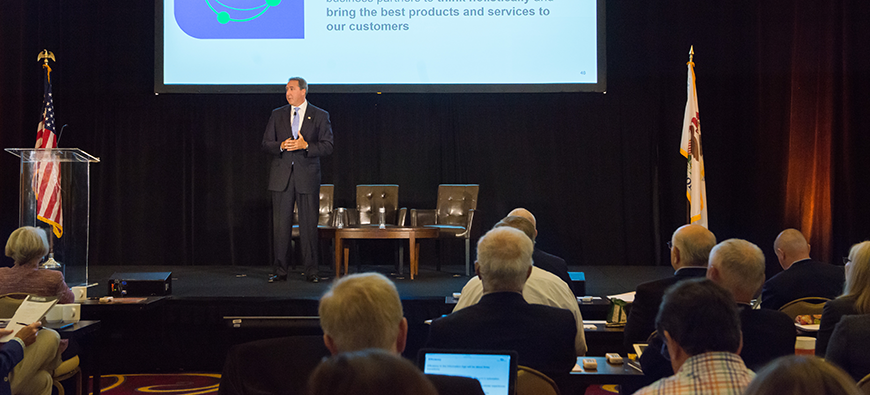
Fifth Third’s CEO on Credit, Technology and the Economy
Cincinnati-based
Fifth Third Bancorp has cultivated a reputation in recent years as one of the
most innovative banks in the country under its current chairman and CEO, Greg
Carmichael.
The 53-year-old banker recently spoke with Bank Director about the tenets of highly successful banks. Carmichael will also be sharing his thoughts with more than 1,300 attendees next week at Bank Director’s annual Acquire or Be Acquired Conference, hosted at the Arizona Biltmore Resort in Phoenix.
Among
the topics Carmichael discussed were his thoughts on the current competitive
environment in the banking industry, the need to maintain discipline, the
processes that Fifth Third, which has $171.1 billion in assets, deploys to make
decisions about technology, and the strategy it uses when dealing with
financial technology companies.
Here’s
a selection of his most interesting insights:
BD: What’s competition like in your markets right now?
GC: I was just at a CEO event with my peers, and we’re all seeing the non-banks – think about private equity insurance companies and so forth – being extremely aggressive in commercial lending, more so than we’ve ever seen them. And what’s also important is the quality, the structure, the looseness of the structure, the lack of covenants, aggressive pricing. It’s never been fiercer than it is today, in my 16 years of banking. And I think my peers would tell you the same thing.
BD: How does that competition impact your strategy?
GC: This is the toughest time to be a good banker. With all the pressures we’re getting from competitors and the investment community looking for growth, looking for return, we have to stay disciplined. The banks that performed best during the crisis were the banks that were disciplined going into it. The banks that were not disciplined either failed or almost failed during the crisis. You know the banks – National City, Wachovia, those guys. So, you’ve got to stay disciplined and you’ve got to take your lumps, so to speak, in order to be successful in the future. We’re at the latter end of this recovery. We’re not forecasting a recession in 2020. But the odds are going to increase in 2021, 2022.
BD: What’s the key to maintaining discipline in a market like this?
GC: It’s about credit appetite and how we define our credit policies, our concentration limits. We have the lowest level of commercial real estate concentration, as a percent of capital, of any of our peer banks. That’s by design. Banks get themselves into trouble on commercial real estate. They get themselves into trouble with leveraged lending. We’ve reduced our leveraged loan exposure by almost 50%. We’ve pushed out $5 billion of commercial credit that didn’t conform to our risk profile. We were very disciplined coming out of the crisis to create a framework that will allow us to perform well through a cycle and to take actions on our balance sheet and within our businesses to de-risk, so to speak, and ensure that we’ll be good for the cycle.
That
takes communication. We have to explain it to the investment community. We had
to talk about what Fifth Third is going to be about in the future and what
we’re not going to be about. We’re not going to be about high growth at all
costs. We’re going to be disciplined, and we’re going to perform well through a
downturn. It doesn’t mean we won’t have losses, but we’re going to perform well,
comparably speaking, during a downturn.
That
means we’re going to forego certain types of business that we used to be in.
We’re not doing large-ticket leasing anymore. We don’t do commodity lending
anymore. We don’t do wholesale mortgages anymore. We exited all of that to be
good through the cycle. And I had to communicate that. But I tell you, that
resonates really well with value investors who want to invest in a company
that’s going to be strong through the various cycles, providing good return,
that doesn’t necessarily have gang-buster years in the good times.
BD: What type of processes are you using to make decisions about technology?
GC: You can’t take six months, eight months, to understand something nowadays. We can’t take six months to a year designing something and then spend two years rolling it out. The world is going to roll by you if you operate at that pace. So, what we’ve done is created our executive enterprise council. We evaluate issues and opportunities on a weekly basis, things that are risks to our company, things that are opportunities. And then we’ve built probably 30-plus agile teams right now that are given the appropriate assignments we want them to innovate around. And the speed at which we get new things into production is a fraction of what it used to take us, three or four years ago.
It’s
a different concept. It’s not linear. We don’t do a requirements document or
design document. We don’t do use cases, application development, then testing.
We go right into development, getting code out there and getting solutions out
there, iterating on them quickly and then bringing everyone together to make a
decision.
BD: What’s your strategy for working with fintechs?
GC: We’ve been partners with technology companies, with bill pay for example, and integrating them into our ecosystem to provide additional products and services to our customers for a long time. Our strategy is to, if we can, buy the capabilities. If we can’t buy the capabilities, we want to partner with somebody that already has them. And if we can’t do that, or if it doesn’t exist, we’ll build it ourselves.



